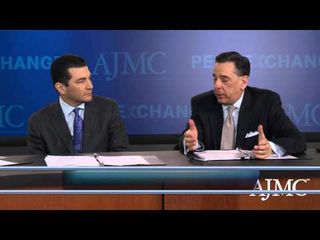
Insurance
Latest News

Video Series

Latest Videos
Shorts






Podcasts
More News

Democrats move to extend ACA subsidies as enrollment closes, leaving consumers uncertain about premiums, coverage, and alternative health options.

In analyzing 2025 Transparency in Coverage (TIC) files from national insurers, the authors found vast payer-level differences; overall, physician/outpatient data were more complete, and hospital inpatient data were less complete.

ICHRAs may help employers and employees manage rising premiums and the loss of extended tax credits, according to expert insights from Ben Light.

Patients with stage I to IIIA NSCLC had lower 2- and 4-year mortality in states that expanded Medicaid coverage.

As open enrollment continues, 77% of surveyed Americans were happy with their options for 2026 health care coverage, although cost concerns surfaced.

Connecting primary care providers and commercially insured adults to outpatient behavioral health services via a digital platform improved health outcomes and reduced medical costs.

With ACA subsidies ending in 2025, Ben Light explains how rising premiums may push individuals toward ICHRAs and reshape employer health coverage strategy.

A new study shows fee-for-service care is linked to higher odds of low-value surgery, suggesting salaried models may reduce unnecessary procedures.

Automating Processes Can Help Prevent Avoidable Losses of Coverage: William Schpero, PhD, MPhil, MPH
Avoiding losses of coverage due to administrative barriers can be done with a focus on making some of the processes automatic.

New research shows immigrant children face higher odds of unmet medical needs as federal and state coverage rules narrow.

Within the same physician groups, 2-sided risk in Medicare Advantage (MA) was associated with higher quality and lower utilization for dually eligible beneficiaries compared with fee-for-service MA and traditional Medicare.

Medicare Advantage beneficiaries with mental health diagnoses see more nurse practitioners and fewer internal medicine and emergency medicine specialists after switching to traditional Medicare.

The uninsured rates may skyrocket when Medicaid work requirements go into effect and if the Affordable Care Act (ACA) subsidies are not extended.

Shared savings reflects continued growth of long-term-care ACOs in Medicare’s value-based models.

The expansion of direct-to-consumer (DTC) pharmaceutical manufacturer models and the upcoming TrumpRx launch offer lower costs but create new complexities for patients.

Experts discuss the clinical and economic burden of idiopathic pulmonary fibrosis (IPF), emerging clinical data, and strategies to improve patient outcomes.

The quick turnaround between the introduction of Medicaid work requirements and implementation could leave many states spread thin, explains William Schpero, PhD, MPhil, MPH

Jonathan Strober, MD, discusses the challenges of diagnosing pediatric myasthenia gravis, especially in seronegative cases, and the importance of antibody testing.

Rachel A. Prusynski, DPT, PhD, discusses her study on how payment models affect home health care delivery and patient outcomes.

Targeted financing, clinician recruitment, and telehealth expansion are needed to improve rural primary care.

Cuts to Medicaid could spell trouble for pediatric health, as millions of children rely on Medicaid to cover their hospital expenses.

Chronic Conditions Data Warehouse comorbidity data vary by insurance status. Analyses using these data that fail to account for insurance status are subject to information bias.

Experts say proposed pharmaceutical tariffs could raise drug prices, impacting patient access and health care budgets.

A vote on the House floor allowed for the government to reopen immediately, but the fight over the extension of ACA subsidies still goes on.

To mark the 30th anniversary of The American Journal of Managed Care, each issue in 2025 includes a special feature: reflections from a thought leader on what has changed—and what has not—over the past 3 decades and what’s next for managed care. The November issue features a conversation with Laurie C. Zephyrin, MD, MPH, MBA, senior vice president for achieving equitable outcomes at the Commonwealth Fund. This interview has been edited for length and clarity.




























